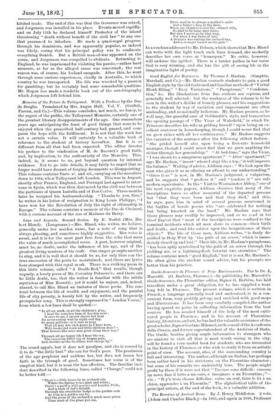Good English for Beginners. By Thomas J. Haslam. (Simpkin, Marshall,
and Co.)—Mr. Haslam counsels students to gain a good English style by the old-fashioned and familiar methods of "Verbal Blank-filling," "Easy Variations," "Paraphrase," "Condensa- tion," &c. His illustrations from fine authors are copious, and generally well selected ; but the weakness of the volume is to be seen in the writer's dislike of homely phrases, and his suggestions to the student by way of variation and improvement are often misleading, and occasionally ludicrous. Mr. Haslam praises, as he well may, the graceful ease of Goldsmith's style, and transcribes the opening passage of "The Vicar of Wakefield," in which Dr. Primrose describes his wife as priding herself "upon being an ex- cellent contriver in housekeeping, though I could never find that we grew richer with all her contrivances." Mr. Haslam suggests the variation of the sentence after the following stilted fashion : " She prided herself also upon being a first-rate household manager, though I could never find that we grew anything the richer through her generalship." "At bed-time," says the Vicar, "I was shown to a sumptuous apartment." "After • apartment,' " says Mr. Haslam, "insert' where I slept like a top ;' it will improve the balance." Writing of advice, Addison says : "We look upon the man who gives it us as offering an affront to our understanding." "Gives it us" is now, in Mr. Haslam's judgment, a vulgarism, and he suggests that "proffers it" and "tenders it" are safe modern equivalents. In the" Visit to Westminster Abbey," one of his most exquisite papers, Addison observes that many of the inscriptions leave no other memorial of the departed persons but "that they were born and that they died," and this, he says, puts him in mind of several persons mentioned in the battles of heroic poems who "are celebrated for nothing but being knocked on the head." Mr. Haslam says that these phrases may readily be improved, and so we read in his Good English that "most of the inscriptions were confined to the terminal incidents which all men share in common—their birth and death ; and read like satires upon the insignificance of their objects." The life of these men, Addison writes, "is finely de- scribed in Holy Writ by 'the path of an arrow,' which is imme- diately closed up and lost." Their life, in Mr. Haslam's paraphrase, "has been aptly symbolised by the path of an arrow through the yielding air, or a lightning-flash betwixt two eternities." The volume contains much "good English," but it is not Mr. Haslam's. He often gives the student sound advice, but his precepts are better than his practice.






































 Previous page
Previous page